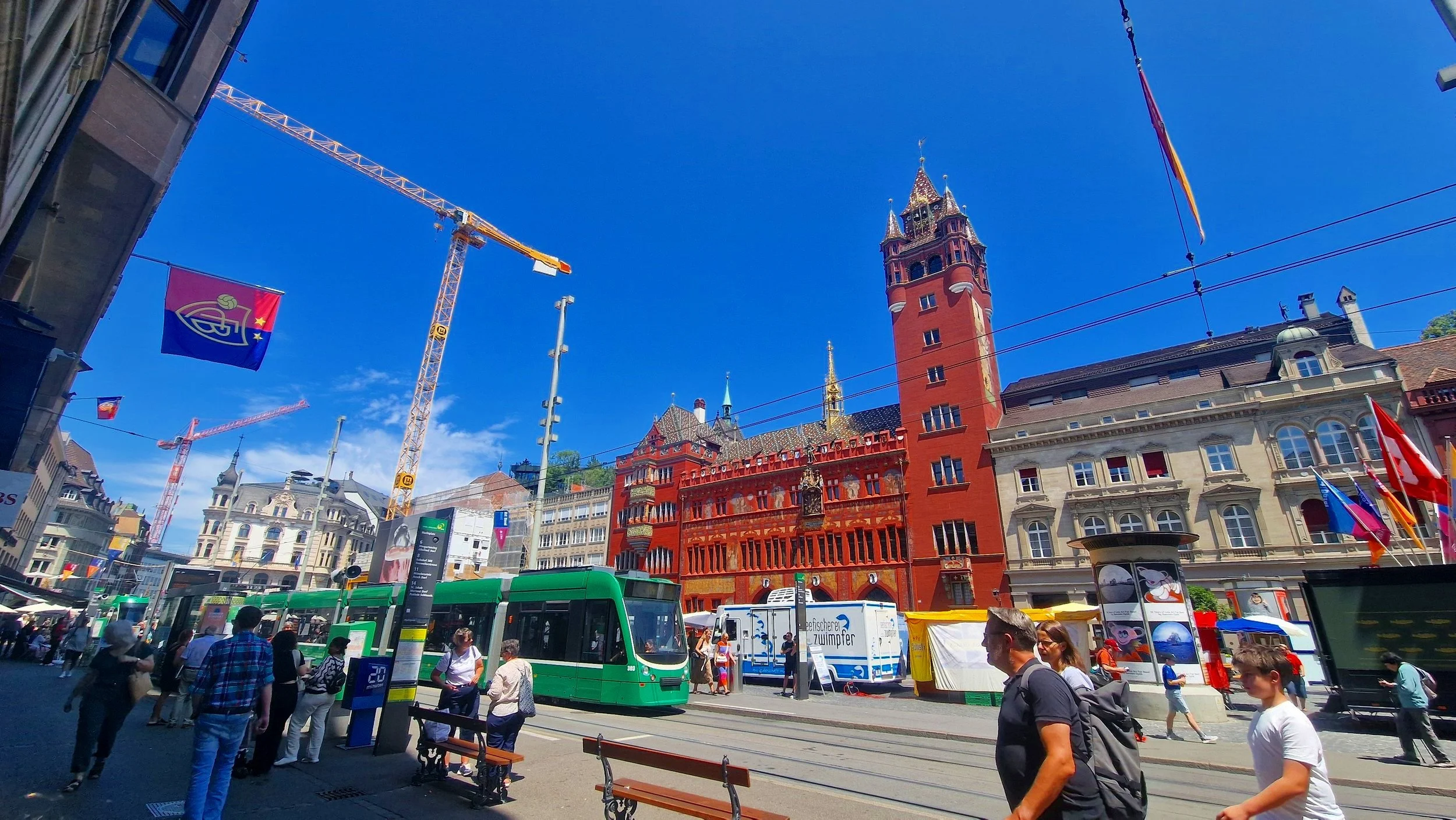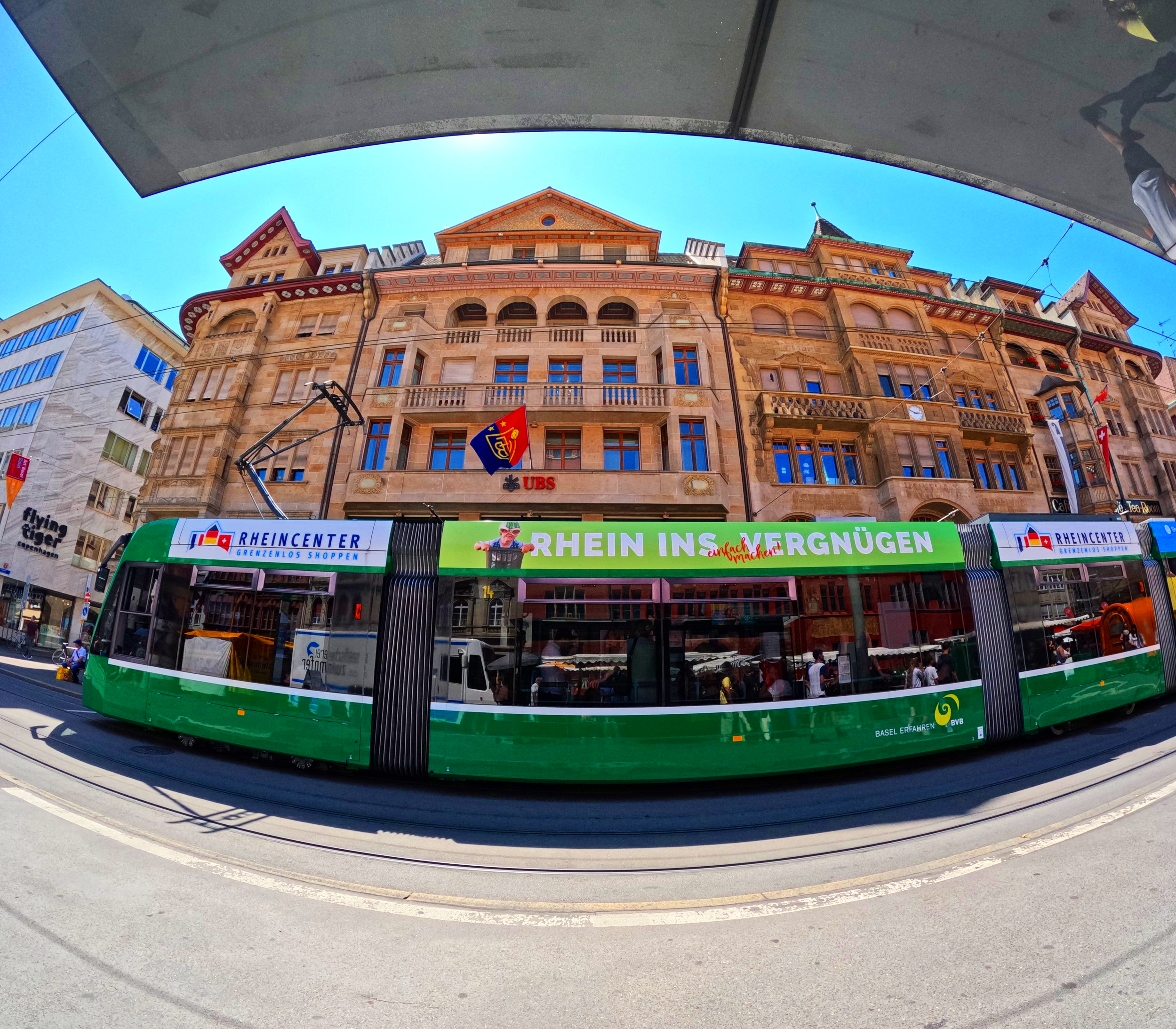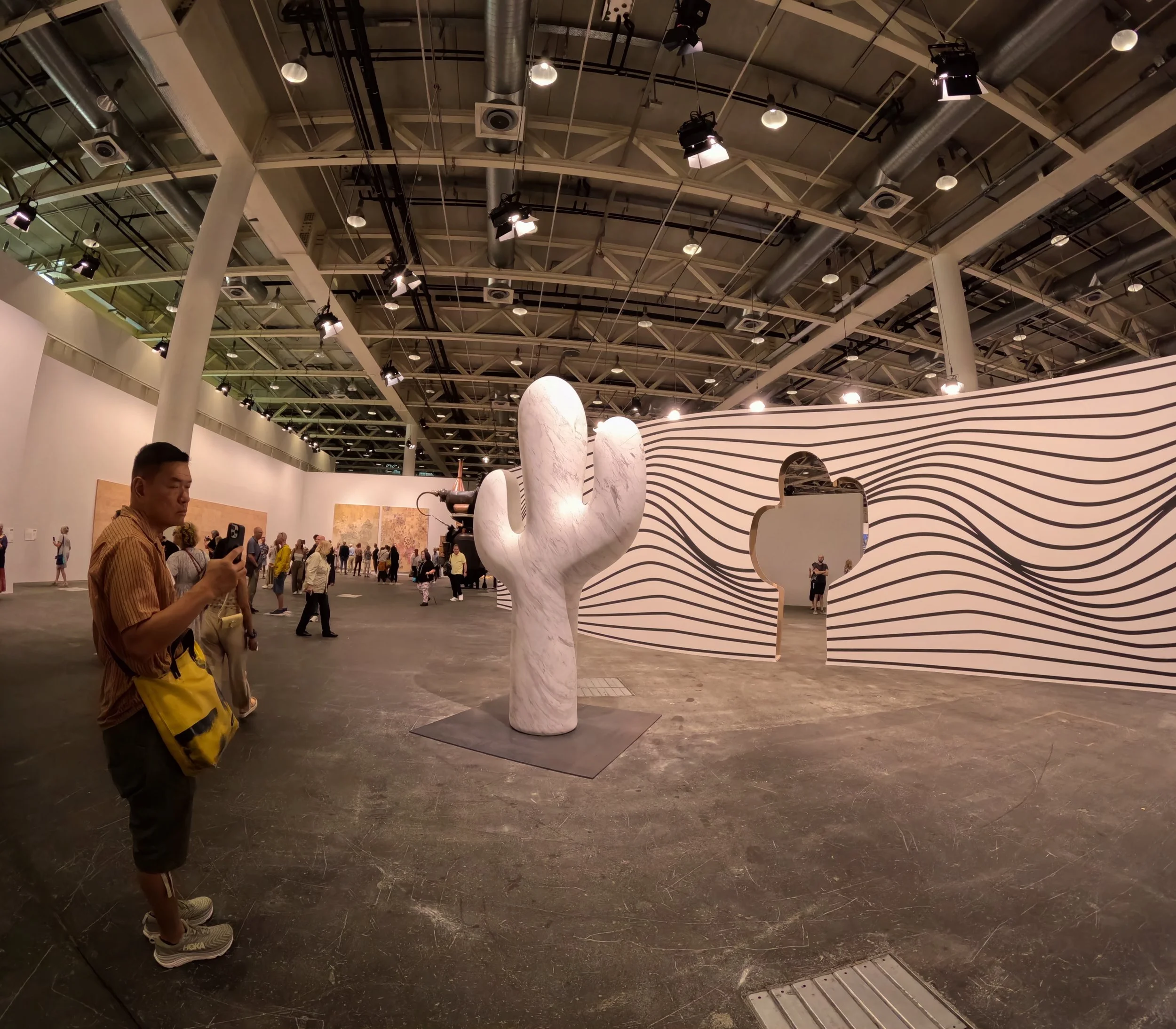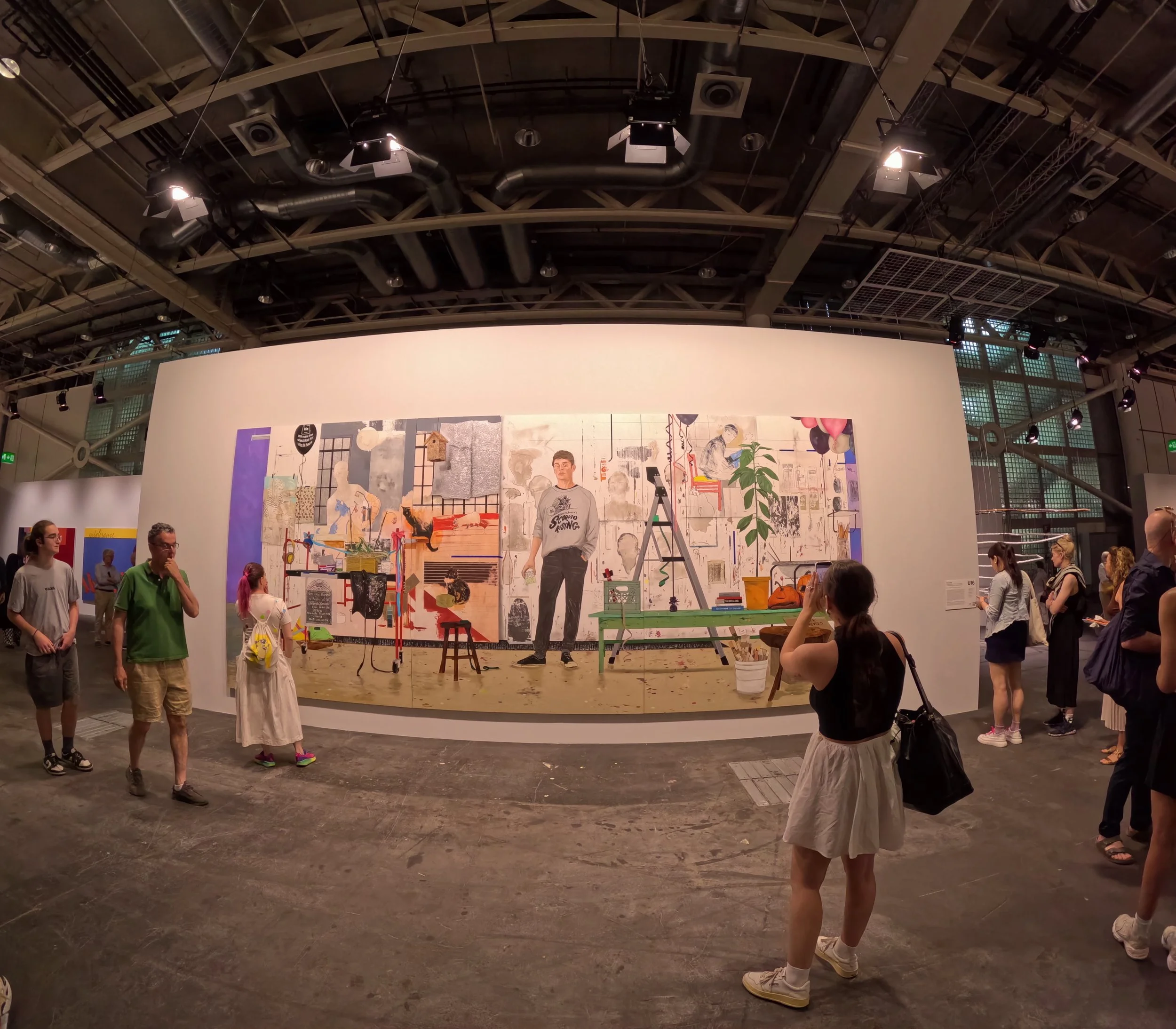Be My Basel Bae
Charming Basel on the Rhine River Photo by Claudio Schwarz
Some cities you visit for the food, the music, the postcard-perfect views. But Basel? Basel draws you in with its unapologetic love of art and its knack for being at the right intersections—of countries, of history, of the messy, beautiful bits of humanity. My trip to Basel proved to be a hinge moment, a confluence of creative ambition, existential promises, and life-altering news I’d almost convinced myself I’d never hear.
The Train Ride to a New Chapter
The train to Basel snakes through a landscape that dares you not to believe in magic. Snow-tipped peaks, rolling green hills, towns balanced on the knife-edge of Alpine perfection. You’d think I’d be glued to the view and lost in the romance of train travel, but my head was elsewhere.
About an hour north of Chiasso via EuroCity train
Just a few nights before our trip, we received notice of having to take a bus from Milano Centrale to Chiasso, a town right on the Swiss border. I was a bit frightened that this little transportation hiccup might be an omen. As we departed from Chiasso to Basel, bracing myself with the bitter remnants of home-brewed coffee, I made what felt like a quiet pact with the universe—or maybe with Kafka himself.
“If this trip changes my life for the better,” I thought, watching clouds roll gently over the mountaintops, “I’ll go to Prague on my birthday month and place flowers at Franz Kafka's grave.”
Kafka, that eccentric, unsettling genius, had inspired my writing and art for years. His themes of alienation, futility, and dark hilarity mirrored so much of my own internal chaos. This train ride, this moment, felt like the right time to honor that connection. And so the deal was made. Basel would determine if I’d finally stand at the threshold of Kafka’s world and continue a set of projects I have yet to release. After all, this art exhibition I was attending featured three of my paintings based on Kafka himself—visiting Art Basel and Photo Basel were merely bonuses.
The train ride to Basel wasn’t just a physical passage but a mental preparation for what lay ahead. I thought about the evening's dinner at our hotel, the Pullman Basel Europe, where conversations would flow as freely as the wine, and where the blend of art, intellect, and culinary sophistication would create its own kind of masterpiece. It felt like the perfect prelude to the artistic immersion awaiting me.
Dinner at the Pullman Hotel – News That Changed Everything
By the time I arrived at the Pullman Hotel for dinner, exhaustion had settled in like an unwelcome guest. Art Basel the next day would be emotionally charged, the kind of event that drains you as much as it fills you. I ordered something light at first, a vegetarian dish of avocado, lime, radishes and other fresh ingredients to counteract the summer heat.
Did I mention Basel was a lot hotter than I had anticipated? The restaurant had its sliding doors open as the evening set in, but the travel since early this morning in Italy to Northwestern Switzerland was felt.
As our drinks arrived, both my daughter and I talked about our plans for Art Basel and Photo Basel the next day. That’s when the email came through.
I remember seeing the first lines of the email from my attorney in California, "VA Grants 100% P&T – Congratulations!"
For those of you who aren’t familiar with my story quite yet—this is a preview—I've been fighting Veterans Affairs in the US since I left Iraq in late 2005 and the Army in 2006. This year, 2025, marks my 20th anniversary of one of the most harrowing, traumatic years of my life. As an Iraq War Veteran and a former member of Team Lioness, I’ve faced decades of challenges, gaslighting, having my narrative stolen from me for profit, and neglect from the VA, VBA, and even so-called advocates who were supposed to help me. For 20 years, I was disregarded and left to navigate a system that failed to see me as a Veteran.
The words felt like they were a jumbled mess at first—I found myself rereading sentences, trying to make them sink in. But the gist of it was there, raw and unmissable. Nineteen years. Nineteen years of fighting for acknowledgment from the Veterans Affairs court, and here it was, finally resolved.
Franz Kafka was exempt from serving in WWI despite his desire to enlist as his employer, the Workers' Accident Insurance Institute for the Kingdom of Bohemia, declared that he was too essential to leave. Being that he was in the field of employee insurance as an attorney, most soldiers of WWI from Bohemia (Czechia) passed through his care as their war injuries were deemed as work-related injuries. In short, Kafka was the then-Czech Veterans Benefits office. The irony is not lost here.
All the PTSD spirals, the depression-induced blackouts, the chronic pain, the nights I thought I wouldn’t make it—all validated in a single moment. The ex-soldier in me held back tears, but the rest of me, the part that Kafka would call, “almost broken yet stubbornly alive,” wanted to sob right there at the Pullman.
That night, my promise to visit Kafka’s grave felt less hypothetical. It felt earned.
Basel Beckons – Art Basel & Photo Basel
Basel is a city that knows how to wear art like a second skin. You don’t just do Art Basel; you surrender to it. From the sprawling convention halls filled with the world’s most celebrated works to the fringes where raw talent and risk-taking steal the show, the energy was electric, infectious, almost overwhelming.
Art Basel isn’t just a fair; it’s a labyrinth, a fever dream of gilded ambition and unapologetic absurdity. It stretches across the Messeplatz like a titan, with polished galleries offering masterpieces so exquisite they seem too fragile for mortal eyes, contrasted starkly by installations so baffling you wonder if the artist’s true medium is the audacity itself.
You thread the chaos, sipping overpriced champagne under the gaze of billionaire collectors deliberating whether the amorphous blob in the corner is art or just a lucrative joke. Yet, amidst the carnival of egos and excess, there’s a pulse, an undeniable urgency. It’s in the shy, ingenious sketches hidden in a dim corner, in the unpolished brilliance of a piece that doesn’t demand your attention but softly nudges at it. Art Basel is a sprawling beast, yes, but it’s one that isn’t tamed or defined—it simply devours.
Art Basel 2025
Photo Basel, nestled in a space where the photography world struts just as boldly, was no less invigorating. The power of a captured moment, suspended in glossy permanence, surrounded me like a living pulse. Wandering through these halls felt like stepping into a kaleidoscope where time, perspectives, and ideas fractured and reassembled into something uniquely yours. I asked my daughter if she had any favorites and as she was still deciding, she led me to a corner of the hall where photos of Las Vegas were featured. We chatted briefly with the photographer, who beamed about her travels and the art of capturing a city that used to be our home for six years.
Glimpses of war at Photo Basel
As we continued to explore, I couldn't help but be in awe of the diverse range of subjects captured through the lens. From bustling cities to serene landscapes, from wildlife in its natural habitat to intimate portraits, every photo seemed to tell a different story. And yet, they all shared one common thread - the ability to capture a moment in time and evoke emotions within the viewer.
It made me reflect on how photography has evolved over the years. From black and white film cameras to digital cameras and now even smartphones with high-quality cameras, everyone has the power to capture their own moments and perspectives. But it takes skill, passion, and a keen eye to truly create a moving masterpiece frozen in time.
The Dreiländereck: Borders Blurred
A spritz at Sandoase near the Dreiländereck
Basel isn’t just cozy in Switzerland. It gazes softly at the borders of Germany and France. The Dreiländereck, where these three countries converge, doesn’t look particularly dramatic—a modernist sculpture overlooks the Rhine, the air thick with industrial hums and muted conversations. And yet, standing there, you find yourself overcome by the absurdity and beauty of human-made demarcations. Invisible lines that say, “This is ours. That is yours.”
A photographer taking his time.
It was here that the weight of my promise to Kafka hit me again. Borders—physical or metaphysical—mean nothing when you carry someone’s work, their perspective, their ghosts, within you. Basel had always been a city of intersections, and now, at the Dreiländereck, I stood at both the edge of countries and something deeply personal. I closed my eyes, took a breath, and thought about Prague.
My daughter and I took our international selfies and then headed for a little beach cafe overlooking the Dreiländereck called Sandoase, complete with sandy floors and palm trees. A little oasis on the Rhine. We had a plate of fries, a soda for my daughter, an Aperol spritz for me, and we were ready to head back into town.
The complimentary city tram, provided by the Pullman Basel Europe, was an unexpectedly pleasant convenience during Art Basel Week. Its vibrantly branded exterior felt like an extension of the city’s artistic spirit, and the smooth ride offered a serene glimpse of Basel’s charming streets and iconic architecture.
The Basel Town Hall (German: Rathaus Basel)
My daughter and I stopped in front of the iconic Rathaus, its vibrant red façade and intricate frescoes radiating history and grandeur. We admired the ornate details of the building before venturing into Old Basel, where cobblestone streets wound through charming alleys and past centuries-old structures. The blend of medieval architecture and vibrant city life was enchanting, but as the sun climbed higher, the summer heat started to catch up with us. Eventually, the oppressive humidity became too much, and we decided to retreat to a shady spot, eager for a cold drink and some respite from the day's intensity.
I appreciate that the Basel trams are basil-colored.
The tram later carried us softly back to our hotel, leaving us time to freshen up and gather ourselves for the evening ahead. Basel SBB awaited, and with it, the anticipation of my exhibition. Preparing for the event was a mixture of nerves and excitement, as I reviewed my pieces one last time, ensuring every detail spoke to the atmosphere of Basel’s dynamic art scene.
Basel SBB Art Show
My art didn’t make it into the offical Art Basel selection—my connections weren’t deep enough yet, and that’s just how the game works. But after seeing everything from the garish to the genius on those pristine walls, I felt strangely at peace with it. There was something raw, unvarnished about showing my work in the train station, a place humming with the rhythm of real life. Travelers rushing past, lovers parting, strangers colliding—it felt like the art found its place here, not coddled in curated spaces but thrown into the merciless tide of humanity. Somehow, that felt more honest.
Showing three Kafka paintings at this group exhibition felt like a new kind of success, one that resonated with a deeper sense of purpose. Kafka’s literature, with its perpetual motion—both physical and emotional—seemed to mirror the restless energy of the train station. His words, like the swirling chaos of travelers, have an uncanny ability to move people, evoking profound reactions that shift their inner landscapes. Placing my interpretations of Kafka’s world in this setting felt uncannily appropriate. It was as though the movement inherent in his stories came alive through the passengers’ hurried steps, the constant flow of arrivals and departures, and the fleeting moments of connection. For the first time, it felt like the art wasn’t confined to a frame—it became part of the rhythm of life itself.
To call this inspiring doesn’t quite cut it—but here's the thing: inspiration isn’t just lofty. It can also be terrifying, like the feeling I got when someone complimented my own work on display at Basel SBB. My pieces, created through sleepless nights and bouts of crippling self-doubt, stood at the literal crossroads of Europe. People stopped, stared, whispered words they likely thought I couldn’t hear. And somehow, amidst all that, I realized I’d already begun to pay my debt to Kafka—the art, after all, was a deeply shadowy nod to his influence.
Reflections: A City and a Turning Point
Near the docks before Dreiländereck
Basel, this compact city that somehow contains multitudes, had officially reshaped me. Its rivers, its streets, its almost obsessive celebration of art—all of it forced me to recontextualize the story I’d built around my life. This wasn’t just a visit to showcase my work or sift through galleries. It was a meeting point, a collision of an old self and a self still forming.
Kafka, of course, knew a thing or two about transformation. About being caught in a state of metamorphosis, suspended between despair and something resembling hope. For me, Basel was that cocoon. The place where my long, painful years of survival began to give way to something new, something neither final nor fully defined.
Cactus, but make it whimsical | Art Basel
I don’t know where the next train, next flight, next moment will take me. As I write this piece from Costa Smeralda, Sardinia, it’s clear that I’m still suspended in a state of flux. But Basel was the first step on this journey, the place where I finally achieved a sense of closure for nearly two decades of tears, alienation, and pain.
It was in Basel that I discovered the courage to confront my past and begin charting a path forward, even amidst the uncertainty that still lingers. And isn’t that ultimately what transformation is all about? Letting go of who we thought we were supposed to be, and embracing who we are becoming. It’s a continuous process, one that never truly ends, but rather evolves and shifts with each new experience and encounter.
Art Basel 2025
Come September, I’ll be on another flight. This time to Prague. This time, gripped not by loss or struggle, but by gratitude. Kafka may have written of alienation, but his works often hid glimmers of connection. And standing at his grave, bouquet in hand, I’ll offer him yet another connection, one more promise fulfilled.
Because that’s what Basel—and life, messy as it is—reminded me to value most. The connections we make, the doors that close and open to us unexpectedly, the moments we share, the fleeting and lasting sources of inspiration, the promises we keep. They are what make each journey worthwhile and give our lives meaning. As I consider the journeys opening up ahead, both literal and metaphorical, in search of those connections and promises fulfilled, I know that these beautiful moments in Basel will be with me forever.










